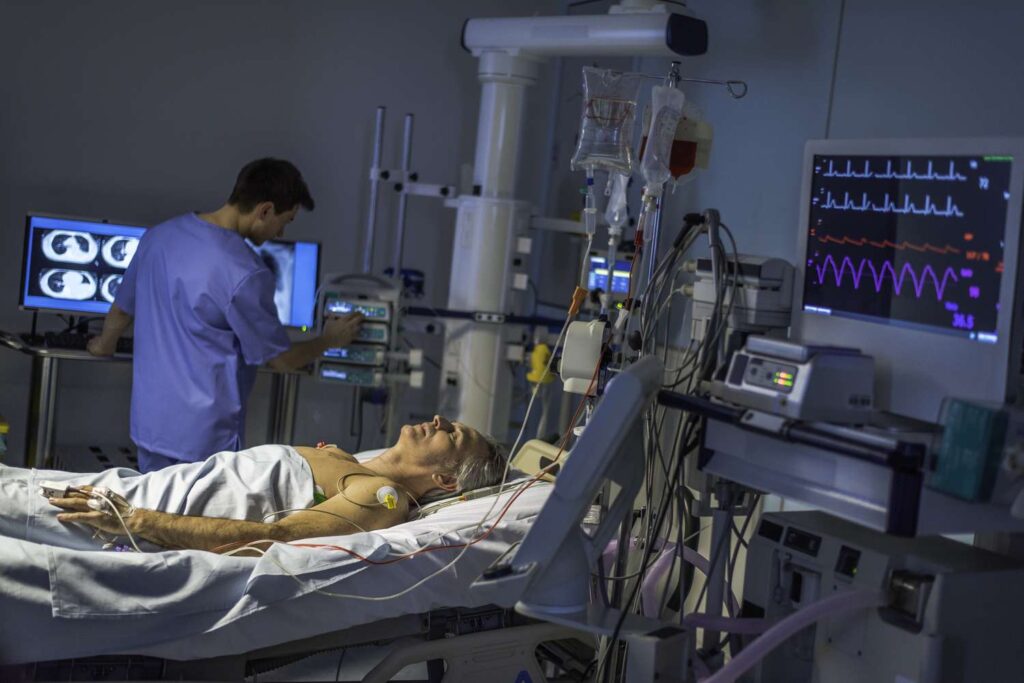

Neurological emergencies demand quick decisions and steady expertise. In need of trauma & critical care in Satara? Get in touch with our expert neurosurgeon today!

Trauma and critical care in Satara, Maharashtra, ensures effective and immediate attention to patients who are dealing with life-threatening injuries or critical neurological conditions like severe head trauma, spinal cord injury, and intracranial bleeding.
If you are seeking specialised trauma and critical care in Satara, Maharashtra, you can consult Dr. Chinmay Phadtare. He is a renowned surgeon in the region, helping patients receive timely treatment for more complex injuries.
Trauma and critical care involve emergency assessment, intervention, and intensive care for patients who are experiencing severe brain conditions, spinal cord injuries, and neurological trauma. These conditions often occur due to falls, strokes, road accidents, and other life-threatening events. Dr. Chinmay Phadtare is the best neurosurgeon in Satara, Maharashtra, specialised in managing complex neurological emergencies with a multidisciplinary methodology. He provides personalised treatment to his patients and guidance at every step of the journey.

Trauma and critical care is a specialised branch of emergency medicine that focuses on the immediate treatment, advanced monitoring, and care, helping patients to recover from severe neurological issues. Here’s how trauma and critical care help manage the below-mentioned neurological conditions, which demand immediate and expert intervention.
A severe traumatic brain injury, or TBI, can lead to chronic pain, bruising, torn tissues, bleeding, and other physical damage to the brain. It happens when a sudden and forceful impact hits the head and injures your brain. It can occur due to accidents, falls, physical violence, or sports injuries.
This treatment option is considered for managing severe TBI. Intracranial pressure, or ICP, is to measure pressure inside the skull to detect early signs of swelling, bleeding, and increased cerebrospinal fluid, which can lead to severe complications if not managed early.
It is a surgical procedure under which a portion of the skull is removed to lower the intracranial pressure and provide space for the swollen brain to expand safely, thereby reducing the chance of further brain damage.
External ventricular drain is a procedure in which cerebrospinal fluid is drained from the ventricles of the brain.
A spinal cord injury refers to damage to any part of the spinal cord, which can also include damage to the nerves at the end of the spinal canal. This condition can occur from traumatic or non-traumatic conditions. Treatment options for spinal cord injury treatment involve
This procedure includes opening or removal of the bone to relieve pressure from the spinal nerves.
It is a surgical process for the treatment of spinal cord injury in which bone fragments are removed and implants like rods, screws, and plates are used to align the spine and maintain stability.
It includes managing patients with serious neurological conditions like brain injuries, strokes, comas, and others.
Neurocritical care includes advanced neuromonitoring techniques such as brain tissue oxygen monitoring, which ensures that the brain is getting enough oxygen to avoid any complications. Another technique includes electroencephalography (EEG), which detects brain seizures, monitors brain function, and evaluates the depth of coma or sedation.
These tools and techniques are performed to provide real-time information about brain health to help prevent any damage.
Seeking the best trauma & critical care in Satara, Maharashtra? Consult Dr. Chinmay Phadtare!
Have questions, need guidance or simply want to talk things through, we're here for you. Just a message away.
423/a/1, Near New DCC Bank, Kalyani Nagar, Sadar Bazar, Satara, Maharashtra 415001, India
+91-78219 92081,
+91-77096 92081
jeevandharahositalsatara@gmail.com

With a patient-first philosophy and experience across high-volume tertiary care centers, he combines medical excellence with the latest technology to ensure the best outcomes for every individual.


423/a/1, Near New DCC Bank, Kalyani Nagar, Sadar Bazar, Satara, Maharashtra 415001, India
No WhatsApp Number Found!
WhatsApp us